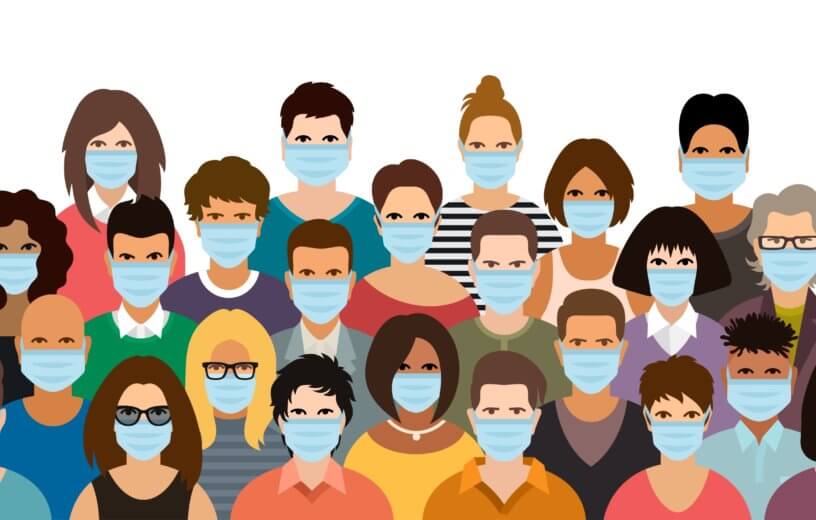CAMBRIDGE, England — Is the worst of COVID-19 behind us? Or is a second wave about to descend upon the world? You’ll probably get a lot of answers to those questions depending on who you ask, of course. A new study from the universities of Cambridge and Greenwich, however, formulates the best way to prevent a second coronavirus wave from coming. Perhaps not surprisingly, it all comes down to the mask.
Simply put, everyone needs to wear a mask, the authors conclude.
Population-wide adoption of face masks in public spaces, in combination with other lockdown measures, should be enough to keep the virus’ “reproduction” (R) number down to under one. This will ward off a second wave of coronavirus infections, according to the research team’s models.
‘Immediate, Universal Adoption Of Face Masks By Public’
Current measures like store closures and social distancing aren’t going to be enough to prevent a second wave. However, the study suggests that even homemade masks offering seemingly limited protection can significantly decrease infection rates. That is, of course, if enough people wear them regularly. The authors note it shouldn’t matter if a person is feeling sick or not; everyone needs to wear one.
It’s proven difficult to convince everyone to wear a mask, as many feel as though their personal freedoms or rights are being infringed upon. There’s no surefire way to remedy everyone’s outrage, but the research team recommends advertising and information campaigns all over the world focusing on the altruistic side of the practice. For example: “My face mask protects you, your face mask protects me.”
“Our analyses support the immediate and universal adoption of face masks by the public,” says lead author Dr. Richard Stutt, from Cambridge’s Department of Plant Sciences, in a release. “If widespread face mask use by the public is combined with physical distancing and some lockdown, it may offer an acceptable way of managing the pandemic and re-opening economic activity long before there is a working vaccine.”
“We have little to lose from the widespread adoption of face masks, but the gains could be significant,” adds co-author Dr. Renata Retkute.
Key To Preventing Second Wave: Keep ‘R’ Number Down
It’s well established at this point that COVID-19 spreads primarily through respiratory droplets, most commonly via speech, cough, etc. So, the study’s authors analyzed what would happened to infection rates depending on varying degrees of mask adoption by populations. They also accounted for a variety of other factors that may influence infection rates, such as people touching their faces more due to wearing a mask all day.
They conclude that if everyone wears a mask whenever they go out in public it would be twice as effective at curbing the spread of COVID-19 in comparison to people only wearing one outside when they feel a symptom. In fact, across all modeled scenarios, if 50% or more of any given population were to wear masks outside regularly, that would be enough to drop the R number to below one. As mentioned earlier, an R number below one is believed to be what it will take to stop future waves and avoid further strict lockdowns.
If 100% of a population adopts masks all the time, that would prevent the coronavirus from resurfacing long enough (18 months, roughly) for a vaccine to be developed.
Never Too Late
It may seem too late to adopt such a policy, but the research also suggests that a 100% mask adoption policy can still stop a second wave as long as it begins within 120 days of the epidemic starting. Moreover, homemade masks are very effective at stopping the virus’ spread. It’s estimated that such masks are still 90% effective at stopping transmission.
“There is a common perception that wearing a face mask means you consider others a danger,” says Professor John Colvin, a study co-author from the University of Greenwich. “In fact, by wearing a mask you are primarily protecting others from yourself. Cultural and even political issues may stop people wearing face masks, so the message needs to be clear: my mask protects you, your mask protects me.”
The study is published in Proceedings of the Royal Society A.
Like studies? Follow us on Facebook!
